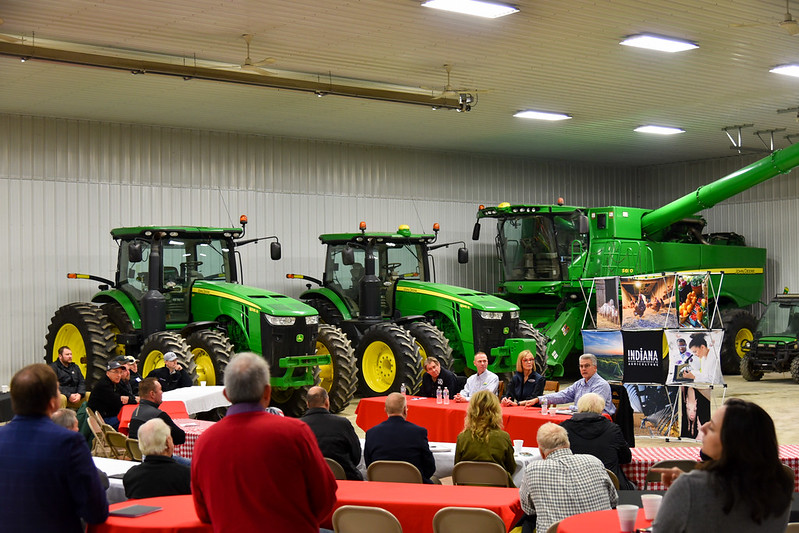News
Recent roundtable helps identify Hoosier farmer concerns

Hoosier farmers and agribusinesses identified bringing land back into production, labor, and supply chains as top issues during a recent agricultural roundtable in Randolph County.
Fourth Generation Farmer Aaron Chalfant hosted the roundtable on his operation in east central Indiana.
“We started out discussing rural broadband and then moved on to bringing ground back that had been taken out of production,” he says. “A young farmer talked about incentives or possible tax breaks to sellers because there is a big investor presence in the ag community. We also talked about labor and wetlands and the potential there to limit the farmer’s ability to ditch, drain, and maintain the ground.”
Chalfant farms with his brothers and father. They run a row crop operation, contract finish hogs for Country View Family Farms, and operate a custom manure pumping business.
“What peaked my interest the most was the potential to bring reclaimed ground back into production. There is a lot of ground in southern Indiana that is extremely rural with not a lot of people living around coal mines. It is a great opportunity for integrators like Country View to go in and build sow farms,” he says. “It’s sparsely populated so it would have a low impact on neighbors. This reclaimed ground is extremely poor in fertility. Well, if you set a hog barn in the middle of it, you’ll have a lot of fertilizer to help build that ground up and make it productive again. The hope there, or the ask, was that the state would kick in and help incentivize this process through tax breaks for these integrators to help get this up and going. The hope there would bring the ground back into production and benefit everyone.
Indiana Lieutenant Governor Suzanne Crouch and Indiana State Department of Agriculture Director Bruce Kettler participated in the roundtable aimed at gathering feedback on how the state can help farmers and agribusiness owners.
“First and foremost it is important for us to get into the communities of the people that we serve and make sure we’re not just sitting in our office or the statehouse. From a state department of agriculture perspective, meeting people in their hometowns and on their farms is really important because people know that they’re free to speak to their concerns and issues,” he says. “And then I think from the lieutenant governor’s perspective, serving as the secretary of agriculture and rural development, it’s again to be able to hear what is on the mind of people in communities and how ISDA and the other entities that the lieutenant governor is responsible for can help. It’s a broad-based look that we’re looking to help inform and make sure the lieutenant governor is informed of issues all around the state.”
Labor continues to impact Hoosier farmers and agribusinesses.
“Not only at the farm level, but even for agribusinesses or co-ops like Co-Alliance that rely on labor. They need truck drivers, farmers need people to work the farm, livestock entities have some differnet requirements in terms of labor needs whether it’s dairy or pork etc.,” he says. “In talking with folks in the last 4-6 weeks, some of the labor concerns are easing a little bit. Some say they’re getting more applications to openings they have, but at the same time, businesses and farms will tell you it’s not completely where they hope to be—it’s just improving a little bit.”
Ongoing supply chain challenges are also top of mind.
“Questions about the supply chain and with that, what are the costs of inputs going to be and what does that look like. If you don’t have enough trucks or truck drivers or qualified drivers with a commercial driver’s licenses, that adds into the supply chain piece as well,” he says.
Kettler says rural broadband was also a big topic with government funding aimed at bridging the digital divide.
“It continues to be a concern for our farms and businesses to make sure they have adequate, reliable connectivity to run businesses and farming operations,” he says. “This is important for both for crop farmers and livestock producers.”
There was another roundtable in November in Tipton County.

Add Comment